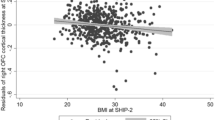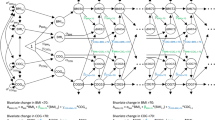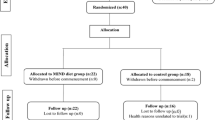Abstract
Background
Obesity has been associated with cognition in observational studies; however, whether its effect is confounding or a reverse causality remains inconclusive. This study aimed to investigate the causal relationships of overall obesity, measured by body mass index (BMI), and abdominal adiposity, measured by waist–hip ratio adjusted for BMI (WHRadjBMI), and cognition across European and Asian populations using Mendelian randomization (MR) analysis.
Methods
We used publicly available genome-wide association study (GWAS) summary data of European ancestry, including BMI (n = 322,154) and WHRadjBMI (n = 210,088) from the GIANT consortium, and cognition performance (n = 257,828) from the UK Biobank and COGENT consortium. Data for individuals of Asian ancestry were retrieved from Taiwan Biobank to perform GWAS for BMI (n = 65,689), WHRadjBMI (n = 65,683), and Mini-Mental State Examination (MMSE, n = 21,273). MR analysis was carried out using the inverse-variance weighted method for the main results. Further, we examined the overall pleiotropy by MR-Egger intercept, and detected and adjusted for possible outliers using MR PRESSO.
Results
No causal effect of BMI on cognition performance (beta [95% CI] = 0.00 [−0.07, 0.07], p value = 0.91) was found for Europeans; however, a 1-SD increase in WHRadjBMI was associated with a 0.07 standardized score decrease in cognition performance (beta [95% CI] = −0.07 [−0.12, −0.02], p value = 0.006). Further, no causal effect of BMI on MMSE (beta [95% CI] = 0.01 [−0.08, 0.10], p = 0.91) was found for Asians; however, a 1-SD increase in WHRadjBMI was associated with a 0.17 standardized score decrease in MMSE (beta [95% CI] = −0.17 [−0.30, −0.03], p = 0.02). In both populations, overall pleiotropy was not detected, and outliers did not affect the robustness of the main findings.
Conclusions
This trans-ethnic MR study reveals that abdominal adiposity, as measured by WHR adjusted for BMI, impairs cognition, whereas weak evidence suggests that BMI impairs cognition.
This is a preview of subscription content, access via your institution
Access options
Subscribe to this journal
Receive 12 print issues and online access
$259.00 per year
only $21.58 per issue
Buy this article
- Purchase on Springer Link
- Instant access to full article PDF
Prices may be subject to local taxes which are calculated during checkout



Similar content being viewed by others
Data availability
This study used publicly available GWAS summary statistics from the GIANT consortium, the UK Biobank, and COGENT consortium. In terms of individual data from the Taiwan Biobank, interested researchers can apply the Taiwan Biobank through formal application biobank@gate.sinica.edu.tw.
References
Abarca-Gómez L, Abdeen ZA, Hamid ZA, Abu-Rmeileh NM, Acosta-Cazares B, Acuin C, et al. Worldwide trends in body-mass index, underweight, overweight, and obesity from 1975 to 2016: a pooled analysis of 2416 population-based measurement studies in 128· 9 million children, adolescents, and adults. Lancet. 2017;390:2627–42.
GBD Obesity Collaborators. Health effects of overweight and obesity in 195 countries over 25 years. N Engl J Med. 2017;377:13–27.
Milaneschi Y, Simmons WK, van Rossum EF, Penninx BW. Depression and obesity: evidence of shared biological mechanisms. Mol Psychiatry. 2019;24:18–33.
Pedditizi E, Peters R, Beckett N. The risk of overweight/obesity in mid-life and late life for the development of dementia: a systematic review and meta-analysis of longitudinal studies. Age Ageing. 2016;45:14–21.
Cournot M, Marquie J, Ansiau D, Martinaud C, Fonds H, Ferrieres J, et al. Relation between body mass index and cognitive function in healthy middle-aged men and women. Neurology. 2006;67:1208–14.
Boeka AG, Lokken KL. Neuropsychological performance of a clinical sample of extremely obese individuals. Arch Clin Neuropsychol. 2008;23:467–74.
Fergenbaum JH, Bruce S, Lou W, Hanley AJ, Greenwood C, Young TK. Obesity and lowered cognitive performance in a Canadian First Nations population. Obesity. 2009;17:1957–63.
Ariza M, Garolera M, Jurado MA, Garcia-Garcia I, Hernan I, Sanchez-Garre C, et al. Dopamine genes (DRD2/ANKK1-TaqA1 and DRD4-7R) and executive function: their interaction with obesity. PLoS ONE. 2012;7:e41482.
Halkjær J, Holst C, Sørensen TI. Intelligence test score and educational level in relation to BMI changes and obesity. Obes Res. 2003;11:1238–45.
Rosenblad A, Nilsson G, Leppert J. Intelligence level in late adolescence is inversely associated with BMI change during 22 years of follow-up: results from the WICTORY study. Eur J Epidemiol. 2012;27:647–55.
Kanazawa S. Childhood intelligence and adult obesity. Obesity. 2013;21:434–40.
Prickett C, Brennan L, Stolwyk R. Examining the relationship between obesity and cognitive function: a systematic literature review. Obes Res Clin Pract. 2015;9:93–113.
Smith E, Hay P, Campbell L, Trollor JN. A review of the association between obesity and cognitive function across the lifespan: implications for novel approaches to prevention and treatment. Obes Rev. 2011;12:740–55.
Davey Smith G, Ebrahim S. ‘Mendelian randomization’: can genetic epidemiology contribute to understanding environmental determinants of disease? Int J Epidemiol. 2003;32:1–22.
Marini S, Merino J, Montgomery BE, Malik R, Sudlow CL, Dichgans M, et al. Mendelian randomization study of obesity and cerebrovascular disease. Ann Neurol. 2020;87:516–24.
Riaz H, Khan MS, Siddiqi TJ, Usman MS, Shah N, Goyal A, et al. Association between obesity and cardiovascular outcomes: a systematic review and meta-analysis of mendelian randomization studies. JAMA Netw Open. 2018;1:e183788.
Thrift AP, Shaheen NJ, Gammon MD, Bernstein L, Reid BJ, Onstad L, et al. Obesity and risk of esophageal adenocarcinoma and Barrett’s esophagus: a Mendelian randomization study. JNCI. 2014;106:dju252.
Mokry LE, Ross S, Timpson NJ, Sawcer S, Davey Smith G, Richards JB. Obesity and multiple sclerosis: a mendelian randomization study. PLoS Med. 2016;13:e1002053.
Debette S, Wolf C, Lambert J-C, Crivello F, Soumaré A, Zhu Y-C, et al. Abdominal obesity and lower gray matter volume: a Mendelian randomization study. Neurobiol Aging. 2014;35:378–86.
Mulugeta A, Lumsden A, Hyppönen E. Unlocking the causal link of metabolically different adiposity subtypes with brain volumes and the risks of dementia and stroke: a Mendelian randomization study. Neurobiol Aging. 2021;102:161–9.
Li YR, Keating BJ. Trans-ethnic genome-wide association studies: advantages and challenges of mapping in diverse populations. Genome Med. 2014;6:1–14.
Seidell J, Björntorp P, Sjöström L, Sannerstedt R, Krotkiewski M, Kvist H. Regional distribution of muscle and fat mass in men–new insight into the risk of abdominal obesity using computed tomography. Int J Obes. 1989;13:289–303.
Emdin CA, Khera AV, Natarajan P, Klarin D, Zekavat SM, Hsiao AJ, et al. Genetic association of waist-to-hip ratio with cardiometabolic traits, type 2 diabetes, and coronary heart disease. Jama. 2017;317:626–34.
Cheng C-H, Ho C-C, Yang C-F, Huang Y-C, Lai C-H, Liaw Y-P. Waist-to-hip ratio is a better anthropometric index than body mass index for predicting the risk of type 2 diabetes in Taiwanese population. Nutr Res. 2010;30:585–93.
Locke A, Kahali B, Berndt S, Justice A, Pers T, Day F, et al. Genetic studies of body mass index yield new insights for obesity biology. Nature. 2015;518:197–206.
Shungin D, Winkler T, Croteau-Chonka D, Ferreira T, Locke A, Mägi R, et al. New genetic loci link adipose and insulin biology to body fat distribution. Nature. 2015;518:187–96.
Lee J, Wedow R, Okbay A, Kong E, Maghzian O, Zacher M, et al. Gene discovery and polygenic prediction from a genome-wide association study of educational attainment in 1.1 million individuals. Nat Genet. 2018;50:1112–21.
Chen C-H, Yang J-H, Chiang CW, Hsiung C-N, Wu P-E, Chang L-C, et al. Population structure of Han Chinese in the modern Taiwanese population based on 10,000 participants in the Taiwan Biobank project. Hum Mol Genet. 2016;25:5321–31.
Genomes Project Consortium. A global reference for human genetic variation. Nature. 2015;526:68.
Akiyama M, Okada Y, Kanai M, Takahashi A, Momozawa Y, Ikeda M, et al. Genome-wide association study identifies 112 new loci for body mass index in the Japanese population. Nat Genet. 2017;49:1458–67.
Pulit S, Stoneman C, Morris A, Wood A, Glastonbury C, Tyrrell J, et al. Meta-analysis of genome-wide association studies for body fat distribution in 694 649 individuals of European ancestry. Hum Mol Genet. 2019;28:166–74.
Shyu Y-IL, Yip P-K. Factor structure and explanatory variables of the Mini-Mental State Examination (MMSE) for elderly persons in Taiwan. J Formos Med Assoc. 2001;100:676–83.
Klimentidis Y, Raichlen D, Bea J, Garcia D, Wineinger N, Mandarino L, et al. Genome-wide association study of habitual physical activity in over 377,000 UK Biobank participants identifies multiple variants including CADM2 and APOE. Int J Obes. 2018;42:1161–76.
Howard D, Adams M, Clarke T, Hafferty J, Gibson J, Shirali M, et al. Genome-wide meta-analysis of depression identifies 102 independent variants and highlights the importance of the prefrontal brain regions. Nat Neurosci. 2019;22:343–52.
Karlsson Linnér R, Biroli P, Kong E, Meddens S, Wedow R, Fontana M, et al. Genome-wide association analyses of risk tolerance and risky behaviors in over 1 million individuals identify hundreds of loci and shared genetic influences. Nat Genet. 2019;51:245–57.
Lane J, Jones S, Dashti H, Wood A, Aragam K, van Hees V, et al. Biological and clinical insights from genetics of insomnia symptoms. Nat Genet. 2019;51:387–93.
Burgess S, Butterworth A, Thompson SG. Mendelian randomization analysis with multiple genetic variants using summarized data. Genet Epidemiol. 2013;37:658–65.
Bowden J, Davey Smith G, Burgess S. Mendelian randomization with invalid instruments: effect estimation and bias detection through Egger regression. Int J Epidemiol. 2015;44:512–25.
Bowden J, Davey, Smith G, Haycock PC, Burgess S. Consistent estimation in mendelian randomization with some invalid instruments using a weighted Median estimator. Genet Epidemiol. 2016;40:304–14.
Hartwig F, Davey Smith G, Bowden J. Robust inference in summary data Mendelian randomization via the zero modal pleiotropy assumption. Int J Epidemiol. 2017;46:1985–98.
Verbanck M, Chen C, Neale B, Do R. Detection of widespread horizontal pleiotropy in causal relationships inferred from Mendelian randomization between complex traits and diseases. Nat Genet. 2018;50:693–8.
Bowden J, Del Greco MF, Minelli C, Davey Smith G, Sheehan N, Thompson J. A framework for the investigation of pleiotropy in two-sample summary data Mendelian randomization. Stat Med. 2017;36:1783–802.
Del Greco MF, Minelli C, Sheehan NA, Thompson JR. Detecting pleiotropy in Mendelian randomisation studies with summary data and a continuous outcome. Stat Med. 2015;34:2926–40.
Liu Z, Yang H, Chen S, Cai J, Huang Z. The association between body mass index, waist circumference, waist–hip ratio and cognitive disorder in older adults. J Public Health. 2019;41:305–12.
Wolf PA, Beiser A, Elias MF, Au R, Vasan RS, Seshadri S. Relation of obesity to cognitive function: importance of central obesity and synergistic influence of concomitant hypertension. The Framingham Heart Study. Curr Alzheimer Res. 2007;4:111–6.
Kerwin DR, Gaussoin SA, Chlebowski RT, Kuller LH, Vitolins M, Coker LH, et al. Interaction between body mass index and central adiposity and risk of incident cognitive impairment and dementia: results from the Women’s Health Initiative Memory Study. J Am Geriatr Soc. 2011;59:107–12.
Zhang T, Yan R, Chen Q, Ying X, Zhai Y, Li F, et al. Body mass index, waist-to-hip ratio and cognitive function among Chinese elderly: a cross-sectional study. BMJ Open. 2018;8:e022055.
Dalton M, Cameron AJ, Zimmet PZ, Shaw JE, Jolley D, Dunstan DW, et al. Waist circumference, waist–hip ratio and body mass index and their correlation with cardiovascular disease risk factors in Australian adults. J Intern Med. 2003;254:555–63.
Czernichow S, Kengne A-P, Huxley RR, Batty GD, De Galan B, Grobbee D, et al. Comparison of waist-to-hip ratio and other obesity indices as predictors of cardiovascular disease risk in people with type-2 diabetes: a prospective cohort study from ADVANCE. Eur J Prev Cardiol. 2011;18:312–9.
Elias MF, Elias PK, Sullivan LM, Wolf PA, D’Agostino RB. Obesity, diabetes and cognitive deficit: the Framingham Heart Study. Neurobiol Aging. 2005;26:11–6.
Gunstad J, Lhotsky A, Wendell CR, Ferrucci L, Zonderman AB. Longitudinal examination of obesity and cognitive function: results from the Baltimore longitudinal study of aging. Neuroepidemiology. 2010;34:222–9.
Shah NR, Braverman ER. Measuring adiposity in patients: the utility of body mass index (BMI), percent body fat, and leptin. PloS ONE. 2012;7:e33308.
Mukherjee S, Walter S, Kauwe JS, Saykin AJ, Bennett DA, Larson EB, et al. Genetically predicted body mass index and Alzheimer’s disease–related phenotypes in three large samples: Mendelian randomization analyses. Alzheimers Dement. 2015;11:1439–51.
Nordestgaard LT, Tybjærg-Hansen A, Nordestgaard BG, Frikke-Schmidt R. Body mass index and risk of Alzheimer’s disease: a mendelian randomization study of 399,536 individuals. J Clin Endocrinol Metab. 2017;102:2310–20.
Zhou Y, Sun X, Zhou M. Body shape and Alzheimer’s disease: a Mendelian randomization analysis. Front Neurosci. 2019;13:1084.
Wenk GL. Neuropathologic changes in Alzheimer’s disease. J Clin Psychiatry. 2003;64:7–10.
Anjum I, Fayyaz M, Wajid A, Sohail W, Ali A. Does obesity increase the risk of dementia: a literature review. Cureus. 2018;10:e2660.
Siervo M, Arnold R, Wells J, Tagliabue A, Colantuoni A, Albanese E, et al. Intentional weight loss in overweight and obese individuals and cognitive function: a systematic review and meta‐analysis. Obes Rev. 2011;12:968–83.
Deng L, Zhang H, Yu K. Power calculation for the general two-sample Mendelian randomization analysis. Genet Epidemiol. 2020;44:290–9.
Acknowledgements
This work was supported by National Health Research Institutes, Taiwan (NHRI-EX109-10931PI, NHRI-EX110-10931PI, NHRI-EX111-10931PI) and China Medical University, Taiwan (CMU110-MF-24). This study was posted without peer review on the preprint server medRxiv.
Author information
Authors and Affiliations
Contributions
Conceptualized the study: SHW, CSW. Performed the analysis: SHW, MHS, and PCH. Wrote the paper: SHW, CSW. Critically revised the paper: MHS, CYC, YFL, YAF, PCH, and YJP. All authors reviewed and approved the final version of the paper.
Corresponding author
Ethics declarations
Competing interests
CYC is an employee of Biogen. The remaining authors declare no competing interests.
Additional information
Publisher’s note Springer Nature remains neutral with regard to jurisdictional claims in published maps and institutional affiliations.
Supplementary information
Rights and permissions
About this article
Cite this article
Wang, SH., Su, MH., Chen, CY. et al. Causality of abdominal obesity on cognition: a trans-ethnic Mendelian randomization study. Int J Obes 46, 1487–1492 (2022). https://doi.org/10.1038/s41366-022-01138-8
Received:
Revised:
Accepted:
Published:
Issue Date:
DOI: https://doi.org/10.1038/s41366-022-01138-8



